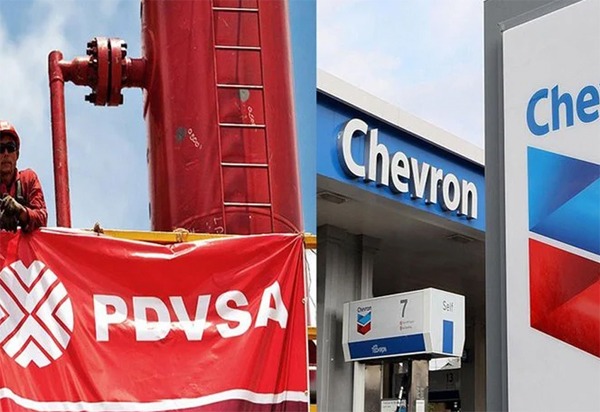- Returns for two joint ventures list about $300 million owing. Trump nominee says deal with Maduro should be ‘re-explored’

Andreina Itriago Acosta, Fabiola Zerpa, and Patricia Laya, Bloomberg News
CARACAS
EnergiesNet.com 01 17 2025
Chevron Corp. filed tax returns worth about $300 million with the Venezuelan government last year, raising questions about how much President Nicolás Maduro is benefiting from the US company’s oil production in spite of sanctions.
Most Read from Bloomberg
Chevron filed documents saying its ventures in Venezuela owed 8.1 billion bolivars to Seniat, Venezuela’s tax agency, in March 2024 under its registered name in the country, Chevron Global Technology Services Company, according to documents reviewed by Bloomberg News. The company is the sole authorized payer for those ventures. It’s unclear if, or how, Chevron paid those taxes.
“Chevron conducts its business in Venezuela in compliance with all applicable laws and regulations,” spokesman Bill Turenne said Thursday by email.
Any form of payment to Venezuela’s government would appear to violate the sanctions waiver Chevron was granted by the US Treasury’s Office of Foreign Assets Control. General License 41 prohibits the US driller from paying taxes, royalties or dividends of any kind to Petroleos de Venezuela SA or any other state controlled entity. It also forbids it from selling oil outside of the US or from expanding its operations.
“Chevron is not just enabling oppression; they are profiting from it,” Representative Maria Elvira Salazar, a Florida Republican, said in an email. “Their licenses have to go.”
In the submissions to Seniat, Chevron’s Petropiar venture filed the bolivar equivalent of about $217 million in income tax in 2023, while its Petroboscan venture filed for $83 million, using an average rate of 27 bolivars per dollar. The US driller has two other ventures with PDVSA and holds a minority stake in all four. Venezuela’s hydrocarbons law also compels companies to pay a third of their production in royalties, as well as other taxes.
Chevron’s relationship with Venezuela is likely to come under intense scrutiny by President-elect Donald Trump, who is expected to take a harder line against the Maduro regime than Joe Biden’s administration. The outgoing president eased restrictions on Chevron’s oil production in 2022 after Maduro renewed talks with the opposition over holding democratic elections. The US was in the midst of decades-high inflation at the time, driven in part by high oil prices.
“Companies like Chevron are actually providing billions of dollars of money into the regime’s coffers, and the regime kept none of the promises that they made,” Secretary of State-nominee Marco Rubio said Wednesday at his Senate confirmation hearing. “All that needs to be re-explored.”
Venezuelan government bonds were slightly down across the curve, retreating after a small rally earlier in the week, following Rubio’s remarks about a potential revision of Chevron’s license to operate in the country.
In a press release after the license was issued, Treasury said it was part of its longstanding policy to “support the peaceful restoration of democracy, free and fair elections, and respect for the rights and freedoms of Venezuelans.”
But Maduro has only cemented his power since then. In the most autocratic moment of his regime yet, he prevented his main adversary from running in last July’s presidential election, declared himself reelected without showing proof, detained more than 2,500 people and forced his rival, opposition candidate Edmundo González, to flee the nation.
This month, the US responded to Maduro’s inauguration by increasing rewards for both his capture and that of his top allies, as well as issuing new individual sanctions on some of his officials. The license allowing Chevron to operate in Venezuela, which renewed for another six months starting Jan. 1, remained untouched.
Treasury didn’t respond to requests for comment sent Wednesday and Thursday.
Now, as Maduro begins his third term, the oil industry is the main driver keeping Venezuela’s economy afloat. The supply of hard currency from foreign operators like Chevron has played a major role in bringing Venezuela’s inflation to new lows. Analysts estimate Venezuela’s output may increase to 1 million barrels of oil a day in 2025, before stagnating the following year.
As a consequence of US sanctions, Maduro drafted an “anti-blockade law” in 2020, which allows the government to modify joint ventures between the state and private companies without making public disclosures. Opposition legislators said at the time the legislation would help obscure the nation’s oil profits.
Two years later Maduro granted Chevron greater control of operations to help Venezuela repay its debt to the company and to increase production. It marked a surprising departure from a longstanding policy of state control over the nation’s prized energy industry, which oversees the largest proven oil reserves in the world.
The US government has allowed a few other oil majors to keep buying and producing Venezuelan crude, including Reliance Industries Ltd. of India, Repsol SA of Spain and France’s Maurel & Prom. Under its license, Chevron is pumping around 200,000 barrels a day — nearly 23% of Venezuela’s overall production.
bloomberg.com 01 16 2025












